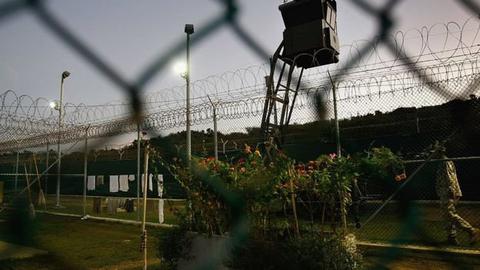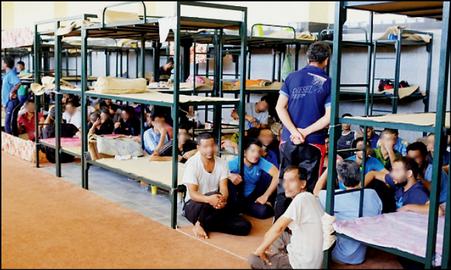In the third of IranWire's reports on the possible coronavirus outbreak in Iranian prisons, we look at Rajaei Shahr, Ahvaz, and Langrud prisons, and also revisit Karaj Prison. Accounts from inmates at these prisons suggest that claims made by judiciary and prison authorities that they are prepared to deal with the potential spread of the virus in prisons are unrealistic, and that the situation for prisoners throughout the country is becoming more and more worrying.
Read more about the possible outbreak in Iranian prisons and moves to quarantine prisoners.
"More than six political and non-political prisoners are held in this room,” a political prisoner jailed in a special ward at Ahvaz Shiban Central Prison told me. “Until yesterday, we were protesting, asking why they did not follow the rules about segregating prisoners because we thought there will be no disaster worse than what they are doing to us. Today we see that when the life of a prisoner has no value, there is always new ways to kill him. Our hall has been quarantined. ‘Prisoners suspected of coronavirus are being quarantined in one of the rooms of the detention center,’ they said. ‘In addition, we are bringing new detainees here because we have no place for their early quarantine.’ When the first person is infected with coronavirus, we will all become infected because we don't even have handwashing liquid in this ward."
Ahvaz Shiban Central Prison has a capacity of 2,000 inmates — and 4,500 people are incarcerated there. On February 26, prison officials explained the new quarantine area in the prison to the inmates, but did not tell them why they were sending them to other wards instead of transferring the suspected patients to the prison medical center or to out-of-prison treatment centers.
The prison health deputy told inmates in the ward that they will be granted temporary leave if they are eligible and can pay the bail amount. It is unclear to what extent this promise will be fulfilled in practice and whether it will include political prisoners, including ethnic Arab Iranian prisoners jailed for activism and several exiled Gonabadi dervishes. Given authorities’ usual stance toward political prisoners, these inmates and their families do not hold out much hope.
Asghar Jahangir, head of the country's Prisons Organization, called on authorities in charge of individual prisons to command full control over the health situation and medical facilities in prison, requesting that they submit a daily report on the state of the health of prisoners. The conditions of the ward selected as the quarantine area for inmates suspected to be infected with coronavirus infected inmates at Ahvaz Prison is just one sign that the Prisons Organization's preventive plans are not being taken seriously.
According to the brother of an Arab prisoner in Shiban Prison, families are very concerned because as far as they can see, prison officials are doing the very least they can do to control the risks."The lack of prisoners' access to basic hygiene facilities such as toilets and hand washing and disinfectants to clean the cells means that they want to do nothing, and all of this is just a hype."
Another person with a family member in prison on political grounds said leave was not being granted to all eligible inmates. "My brother has served more than a third of his sentence; we have provided the bail and he has requested a leave on numerous occasions, and we have requested leave as well. We pursued the matter from outside but have not received any response. I hope the prison health deputy's promises come true and this time my brother will be able to come out on leave.”
Orders Not Being Implemented
The head of the Prisons Organization also ordered prison officials across the country to stop sending prisoners to courts unless it was absolutely necessary. He also said officials should refrain from transferring inmates to other prisons without prior coordination.
A Rajaei Shahr Prison official in Karaj has said the order not to make transfers has either not been issued seriously or is not being taken seriously by the provincial authorities of the Prisons Organization. "This means that detention orders are issued as before and the daily entry of new inmates has not changed. But, most strangely, in spite of Jahangir's explicit order to halt the transfer of prisoners between prisons, a large number of prisoners were transferred from Greater Tehran Prison to this prison."
According to the Rajaei Shahr prison official, the Prisons Organization may put the task of ordering a prisoner to be sent to court or to a new detention facility onto judicial authorities, but the organization itself is responsible for the transfer of prisoners between prisons. "On Wednesday, February 26, inmates from the workers' ward at Greater Tehran Prison were transferred to Rajaii Shahr Prison to serve and cook for prisoners there. At the Greater Tehran Prison, several inmates are suspected of having coronavirus and several have died. Any transfer in these circumstances means an immediate assistance to distribute the coronavirus more quickly to other prisons. A number of my colleagues and I will save our lives and leave. They can run their own prison."
The same prison official says currently the situation in the prison is critical because it cannot provide medical services to inmates in what is essentially a critical health situation. "There are no facilities for patients here; the prison health system has been used to accommodating and dispatching patients for many years as required. One of the medical personnel said that every day prisoners come in with severe fevers and coughs; we measure their temperature, give them some painkillers and pills to address the fever and return them to the ward. Because no tests are done, it is unclear whether they really have the normal flu or whether these are coronavirus symptoms."
It is not yet clear whether anyone in Iran's prisons, including in the Greater Tehran Prison, has been infected with coronavirus, though rumors about infections are rife. The very poor health in prisons in general and the high concentration of prisoners in Iranian prisons have sounded the alarm. Kianoush Jahanpour, head of public relations at the Ministry of Health and Medical Education did not rule out the possibility of an outbreak but he said no reports had been received so far. However, there has been speculation that reports have actually been sent, but that officials were not disclosing what they said.
Among various news circulating about prisons and coronavirus in the last few days, details about Greater Tehran Prison, also known as Fashafuyeh Prison, have been the most widely heard. Reports from February 17 said that four prisoners had died on Ward 2 of the prison. But no information about the identity of those who died has been made public.
Meningitis or Coronavirus?
However, prison officials say the four men died of meningitis — another contagious disease that could endanger the lives of other inmates. There appears to be no will among authorities to stop the spread of meningitis in prison, despite it being relatively easy to diagnose and even treat at an early stage in some cases.
Naturally, families worry that the patients may have died from coronavirus, not meningitis. According to an inmate at Greater Tehran Prison, prison officials have transformed one of the wards in Section Four of the prison, formerly reserved for Gonabadi dervishes, into a quarantine ward for any contagious illness. ”Prisoners with tuberculosis, meningitis, and recently-suspected coronavirus patients are all kept in this ward. The four who died seven days ago were on this ward. It is not clear what they had. The situation is painful. Instead of treating meningitis inmates, they have left them there to die in the most painful situation possible."
The inmate said people are very afraid if they get any kind of illness."With coronavirus there is a chance to survive. But if you were transferred to that dungeon, you would also definitely get meningitis from inmates there and then you will definitely die."
No testing for coronavirus is being done at Greater Tehran Prison either, and since Iranian authorities initially denied Iran had been affected by the virus it is impossible to say for sure the reason for the deaths.
But the inmates we talked to throw the meningitis claim into question. On Wednesday February 26, Hamid Reza, 44, a prisoner held in ward 4 of Section 2 of the prison on charges of financial misconduct, died after coming down with a bad cough. Hamid Reza had reportedly been ill for a few days and received no proper treatment for his flu-like illness. "The problem is that severe coughs and cold-like symptoms are common symptoms of flu and not meningitis,” the inmate told me “The only sign that is common between meningitis and coronavirus is fever. Prison officials say Hamid Reza died from meningitis. Hamid Reza was coughing heavily, but not feeling dizzy or vomiting, which are other symptoms of meningitis. Maybe he had a flu. Maybe he had coronavirus and is dead because of it. If that is the case, all the inmates in ward 4 of section 2 of the prison will now be infected. Nobody really knows. Of course, everyone will probably understand the situation much sooner than they think...”
In Greater Tehran Prison, one ward in section 1 has been allocated to inmates suspected of having coronavirus, though there has so far been no news of detainees being transferred to the ward. But at the same time, two section 1 inmates, identified as suspected coronavirus cases, were quarantined in the clinic of section 1. In addition, it is said that Mohammad Reza Moshiri, an inmate from ward 5 in section 2m and Reza Jahangir from ward 10 of this section, have been transferred outside that section showing symptoms similar to coronavirus. It is unclear where they were taken and where they are being held.
Like the Rajaei Shahr prison in Greater Tehran Prison, disputes between prison officials and staff and the prison guards are on the increase. Almost all of the detention centers including Greater Tehran Prison and Shiban Prison in Ahvaz, do not have toilets and basic hygiene facilities, a factor that could likely accelerate the spread of the virus in a prison. Some prison staff have said if these conditions persist and detainees are not provided with preventive measures and not transferred to treatment centers, they will leave their places of work because they worry about their own health and their families' health.
There are unconfirmed reports that the person in charge of one of the Karaj Central Prison stores has contracted coronavirus. According to the Center for Human Rights Supporters website, Saeed Soltanpour, a dervish inmate in the central prison of Karaj, reported on Wednesday, February 26 that the patient was a shopkeeper going by the name of Abbas.
Soltanpour said that, given the inmates' move from the workers' ward to other sections in the prison, and their ongoing links to the store, there was concern that prison staff would have been exposed to the virus and potentially spread it throughout the prison. Saeed Soltanpour has also reported that an old man suspected of having coronavirus is also being quarantined in a hall in this prison, which was allocated to quarantine a few days ago.
At Evin Prison, the concern over prisoners being affected by coronavirus continues. Saeed Malekpour, who has been held in the prison for many years, wrote on Facebook that while he does not know how true the rumor is, he has heard that prisoners at Evin Prison have been issued new instructions in response to the coronavirus outbreaks and the chaos it has created in prison, and and that all prisoners in Evin are due to be granted temporary leave until the end of April.
Shari Izadi, the wife of Anousheh Ashouri, an Iranian-British dual national currently incarcerated, has also said she is concerned about the forced transfer of her husband and other prisoners to a new ward in Evin Prison, which she says puts prisoners at risk of coronavirus. According to Izadi, her husband and other inmates at Ward 12 of Evin Prison had refused to move to Ward 4 because there are at least three inmates with suspected coronavirus on the ward.
A prisoner held in the central prison of Qom, also known as Qom Langrud Prison, also said in a phone call with his family that the virus has reached that prison. "Coronavirus have reached the prison through visits, inmates coming back from leave, and prison guards. There have been five prisoners identified as affected by coronavirus so far and they have been quarantined."
If the inmates of Langrud Prison in Qom have really contracted coronavirus, it could be said that the religion and saints in the holy city of Qom, although unable to defeat coronavirus, at least sent it to jail.
visit the accountability section
In this section of Iran Wire, you can contact the officials and launch your campaign for various problems


























comments